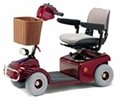
Elderly Diseases
Information and Resources
We've written a series of articles on common elderly diseases which provide you with the information you need to know to better care for your aging parents.
Learning about health issues - on top of being a caregiver - can be overwhelming. We understand.
That's why we've focused on just the essentials.
Knowing about your elderly parent's health conditions can help you care for them and keep them as safe and independent as possible.
Their health conditions can affect their diet, their routine and can even impact their ability to complete everyday tasks.
That's why it's important to learn as much as you can about their health conditions so you can keep them (and yourself) safe.
Below you will find links to articles explaining what you need to know about elderly diseases.
Alzheimer Symptoms in Elderly
Alzheimer's Disease is more than losing one's memory. It's important to learn about the symptoms of Alzheimer's Disease so you know more about what your elderly parent is experiencing and what you can do to help (both now and in the future).
For more information: Alzheimer Symptoms in Elderly
Congestive Heart Failure in Elderly
Congestive heart failure (CHF) is a condition in which the heart's function as a pump is not adequate to meet the body's needs. As with all health issues, information is the key to ensuring your elderly parents have the highest quality of life as they can.
For more information: Congestive Heart Failure in Elderly
Elderly Dementia
Elderly dementia is the progressive loss of mental abilities - including memory, attention, language and problem solving - that is severe enough to interfere with a person's daily functioning.
The four main types of elderly dementia are: Alzheimer's Disease, Vascular Dementia (Multi-Infarct dementia falls under this type), Lewy Body Dementia and Frontotemporal Dementia.
For more information: Elderly Dementia
Elderly Depression
Elderly depression is a common elderly disease but can be difficult to differentiate between dementia, depression and even delirium. Knowing more about elderly depression and the signs/symptoms will help you care for your elderly parents.
For more information: Elderly Depression
Elderly Diabetes
Diabetes, or diabetes mellitus, is when an individual has high blood sugar because their body doesn't produce enough insulin or because cells don't respond to the insulin produced. Insulin is a hormone produced by the body to control blood glucose (sugar) levels.
For more information: Elderly Diabetes
Hallucinations in Elderly
Hallucinations in elderly are abnormal sensory reception - usually auditory or visual - that the senior experiences while they are awake. It can be very disturbing for the elderly as they truly believe this is happening and become upset or agitated that no one believes them.
For more information: Hallucinations in Elderly
Hypertension in the Elderly
Hypertension is often called the "silent killer" because most people have no signs or symptoms. The main signs and symptoms of hypertension do not occur until blood pressure is dangerously high. At this time you might see headaches, nosebleeds and dizziness as indicators.
For more information: Hypertension in the Elderly
Return to Caring for Aging Parents






New! Comments
Have your say about what you just read! Leave me a comment in the box below.